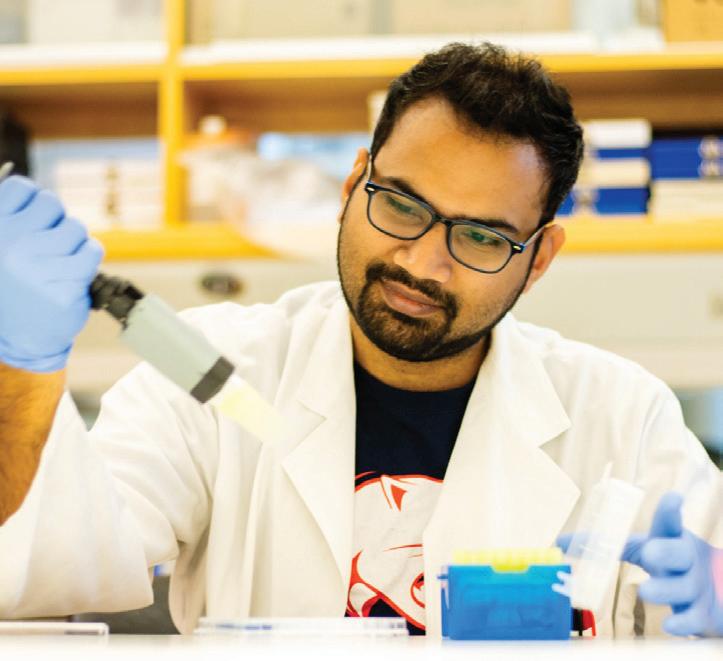
2 minute read
Research findings could improve management of prostate cancer
Srijan Acharya, Ph.D., a postdoctoral researcher at the Mitchell Cancer Institute, serves as the lead author on a research study that offers promising potential in managing prostate cancer more effectively.
His research unveils a novel mechanism to explain contradictory actions of androgens in prostate cancer. He conducted his research in the lab of Ajay Singh, Ph.D., professor of pathology at the Whiddon College of Medicine. The work was supported by funding from the National Cancer Institute and the Mitchell Cancer Institute.
Advertisement
Androgens, which are a group of male hormones, play a significant role in the growth of prostate cancer. “Therefore, lowering their levels or inhibiting their function remain frontline treatment options for patients with advanced or metastatic prostate cancer,” Singh said.
Although androgen-suppression therapy – also known as hormone therapy – is effective in most patients, it inevitably fails in the long term. “Interestingly, it has been observed that androgens at high doses can also suppress prostate cancer growth, which has led oncologists to examine androgen supplementation as a therapeutic approach in clinical trials,” Singh said. “The resulting data is promising; however, the mechanisms underlying the dichotomous action of the androgens remain unclear, which could yield molecular signatures to help in prospective identification of likely responders.”
Their research identified that androgens confer their growth-promoting action by inducing the expression of a protein, MYB, which the group identified earlier to be overexpressed in prostate cancer. “Interestingly, we found that at high doses androgens suppressed the expression of MYB through induction of negative regulatory microRNA, miR-150,” Acharya said.
“Thus, we have identified MYB and miR150 as two important functional targets downstream of androgen signaling, whose levels can be used for therapeutic planning and to monitor the response of andro- gen-targeted therapies in prostate cancer,” Singh added. “In addition, newer therapeutic approaches that either inhibit MYB function or enhance miR-150 levels in prostate cancer cells can be evaluated to manage prostate cancer more effectively.”
Postdoctoral researcher Srijan Acharya, Ph.D., is studying the mechanisms underlying the contradictory actions of androgens in prostate cancer.
Researchers identify novel independent regulator of colon cancer angiogenesis
Researchers at the Mitchell Cancer Institute and the Whiddon College of Medicine have identified neuropeptide Y (NPY) derived from cancer cells as an independent regulator of colon cancer progression.
Neuropeptides are chemical messenger molecules that co-exist in nerve cells with smaller neurotransmitter molecules, allowing neurons to communicate with one another. NPY is one of the most abundant neuropeptides in the body, widely expressed throughout the central and peripheral nervous systems.
The research, led by Chandrani Sarkar, Ph.D., assistant professor of pathology, recently was published in the British Journal of Cancer. Their findings provide the first evidence that NPY, through its Y2 receptor, promotes angiogenesis – the formation of new blood vessels from existing vessels – in colon cancer, thereby promoting growth and progression.
“Angiogenesis is a well-established target for treating several cancers because it is an essential process required for the growth and metastasis of many solid tumors, including colon cancers,” Sarkar said.
Using Y2R antagonists alone or adding Y2R antagonists to conventional chemotherapeutic and anti-angiogenic treatment regimens in colon adenocarcinomas that express high levels of NPY is a promising therapeutic strategy, she said.
Spanish-speaking liaison hired to address disparities in autism care Autism services aren’t as readily available to some populations nationwide, but the USA Regional Autism Network is taking steps to address barriers to care in Alabama. To address this growing need, USARAN added a Hispanic community liaison, Veronica Valero Cervantes, to the team to help connect Spanish-speaking families to the network of autism services. USARAN, part of a statewide program that is funded through the Alabama Department of Mental Health, is tasked with providing education and connecting autistic people, their families and service providers to the resources they need, including therapy, in-school assistance and adult support.
USA Health University Hospital recertified as Level I trauma center
Marking 14 consecutive years, University Hospital’s Fanny Meisler Trauma Center received the Level I trauma center certification from the Alabama Department of Public Health. University










